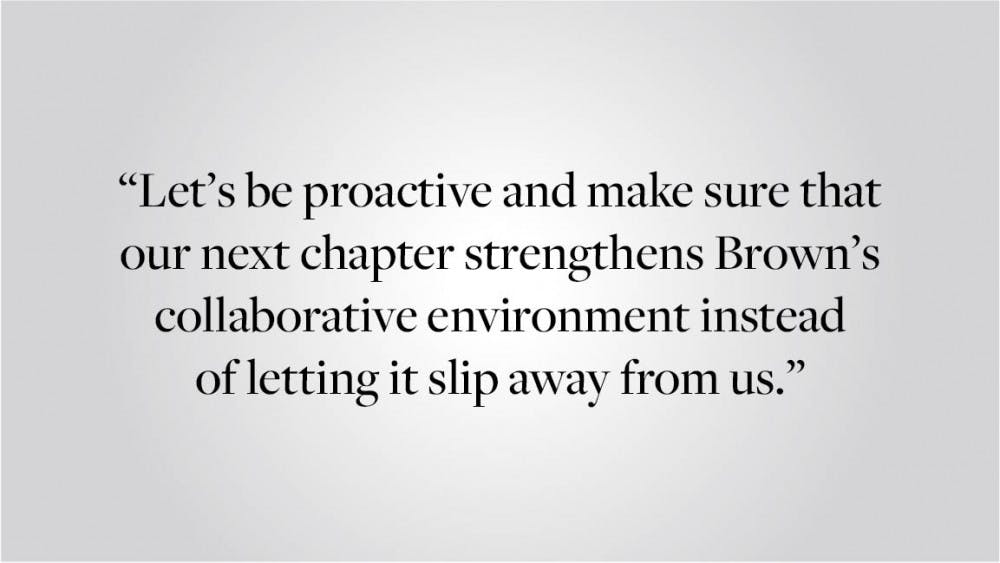Student life at Brown has changed dramatically during COVID-19, and while many of us expected our hiatus from an in-person college experience to be brief, we have already passed the one year mark of attending university online. At this point, we can no longer ignore the fact that the events of the pandemic will have long term effects on student life at Brown. Currently, we even have students who have never attended an in-person class or student group event.
When the University created the Healthy Fall 2020 Task Force last April, its mission was to develop a plan that would allow for “the safe reopening of the campus in fall 2020.” Having fulfilled its purpose, the task force is no longer actively meeting. Yet one may ask why a similar focus has not been placed on preparing campus for a full return to “normal” as the effects of this pandemic begin to greatly subside.
Campus life would benefit greatly from the creation of a working group focused on bringing various stakeholders together weekly to proactively manage the long-term implications of college life post-COVID. Especially as vaccinations become more widespread and we transition through a period of hybrid operations, there will be numerous decisions the University will have to make that will shape that transition. Will there be options for students to take courses via Zoom on days they cannot make it to their seminar or lecture? How will first-years, whose first entire year at Brown will be stunted by the abnormalities of this situation, be supported into their sophomore year? For student groups whose senior leadership have graduated, how will new members learn to manage their newly inherited responsibilities?
Having a space for students, staff and others within the campus community to collaborate on these policies would be vital to crafting effective plans in this highly fluid situation. Each of us have had wildly different experiences during the pandemic, and our transitions back to our next new normal will no doubt be incredibly diverse. Creating an intentional working group composed of current underclassmen, upperclassmen, staff and administrators to prepare for what may arise as we transition could help assure that important issues are less likely to fall through the cracks.
While figuring out how we best transition should be of paramount importance, there are also a great deal of lessons to be learned from our COVID-modified educational experience that should not be forgotten upon a return to something akin to normal. A working group such as this one should be tasked with figuring out how to convert these lessons into tangible reform. COVID-19 has revealed deeply rooted problems within the University, so our transition going forward will be a unique opportunity to address not only the issues that arose directly due to the pandemic, but also the issues that became much more salient under these circumstances. I spoke with Maria Guerrero-Martinez ’21, the only undergraduate who served on the Healthy Fall 2020 task force, who raised the issue of course accessibility. She emphasized a widely shared view that it’s something “that was a problem before, but wasn’t a problem for as many people as it is now.” While we have made some strides in improving digital access to Brown resources, such as providing more note-taking and closed caption services and improving flexibility on attendance requirements, more work can be done and these changes should be lasting, not temporary measures. Having student voices at the table to help both predict problems and address those that have been exacerbated during the pandemic is essential to maintaining the spirit of collaboration upon which Brown prides itself.
“Immediate feedback from the student body is important,” said Guerrero-Martinez, and it was certainly much easier to get it when students and staff could talk in hallways between classes, in common spaces or at social events. But as the organic interpersonal interactions of life at Brown disappeared, Guerrero-Martinez experienced firsthand the challenges of drafting and implementing University policy changes, which directly affected students, without immediate and easy opportunities for conversations amongst diverse student voices. In our isolated worlds, it’s hard to witness the experiences of our peers or to see all the work being done to try to optimize our circumstances. Especially as the University works to prepare for this next normal even as we persist virtually, it’s vital to offer a dedicated space for these discussions that previously would have taken place naturally.
Even without the heightened complexities and tensions associated with facilitating college life under a pandemic, there is often a sense of disconnect between students and staff or administrators. Guerrero-Martinez got a novel perspective on this through her time on the task force, saying “I’ve seen staff and faculty working relentlessly to try to make it easier for students, the same way I’ve seen students struggling regardless.” Without our common spaces and interactions on campus, it’s easier to antagonize the people making decisions because it’s harder to have casual conversations about what is and is not working. A fundamental takeaway from Guerrero-Martinez’s experience is that she thinks “people do want to try to help on all sides,” which is why we need to “make sure we’re continuing to make those spaces where people can bounce ideas off each other and brainstorm solutions.” Establishing a new working group as a venue for students and administrators to continue coming together as we transition into this next new normal would pay dividends for our campus’s future.
We are approaching an incredible growth opportunity for Brown’s capacity to take better care of its community. Let’s be proactive and make sure that our next chapter strengthens Brown’s collaborative environment instead of letting it slip away from us.

ADVERTISEMENT




